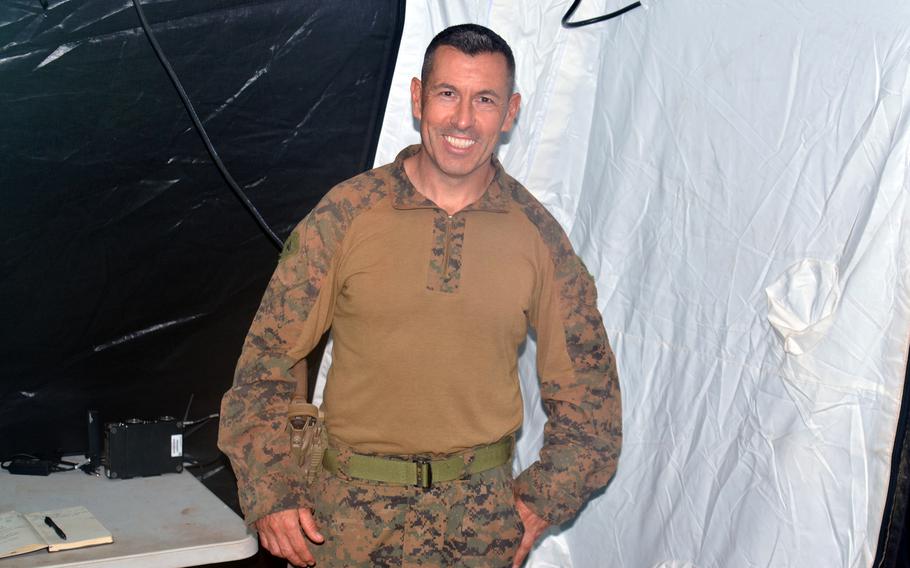
The commander of Marine Rotational Force – Darwin, Col. Brian Mulvihill, poses at Mount Bundey Training Area in Australia's Northern Territory, July 24, 2024. (Seth Robson/Stars and Stripes)
MOUNT BUNDEY TRAINING AREA, Australia — A Marine rotational force in northern Australia is ready to back up the Philippines in clashes with China over disputed territory in the South China Sea, according to the force’s commander.
“We were given a warning order to support the Philippines defense forces in resupplying of the Second Thomas Shoal,” Marine Rotational Force — Darwin commander Col. Brian Mulvihill said Wednesday at an Outback training camp in the Northern Territory.
Mulvihill, a veteran of Iraq and Afghanistan, commands 2,000 Marines in the territory. He said members of the rotational force have been in the Philippines for extended periods this year for the Balikatan, Valiant Shield and Marine Aviation Support Activity exercises.
Clashes between Filipino and Chinese forces at the shoal have intensified in recent months. The Chinese coast guard has interrupted Filipino navy and coast guard efforts to resupply troops on the grounded BRP Sierra Madre. The rusted warship houses a garrison to reinforce the Philippines’ claim to the shoal.
Beijing and Manila agreed Sunday to deescalate at the shoal without conceding either side’s territorial claims, according to statements from both country’s foreign ministries reported by The Associated Press that day.
The Marines have been monitoring events at the shoal over a drone feed, Mulvihill said.
“We were ready to support the Philippine defense forces,” he said, noting that Marines across the Pacific are also ready to back the U.S. ally.
The rotational force can airlift food and water by pushing pallets out of helicopters, he added.
“We can control airspace and aircraft from many nations,” he said. “We provide a range of options if a host nation, through the embassy, requires assistance.”
The rotational force was also ready to support Papua New Guinea after a deadly May 24 landslide that buried hundreds of people. Marines were in the islands earlier that month, but local officials did not ask for their help, Mulvihill said.
Marine Rotational Force — Darwin has evolved from a unit that trains with its counterparts to a crisis-response force under the Hawaii-based U.S. Indo-Pacific Command, he said.
“Anything we do here, we are partnered with another military,” he said. “In order to create stability in the region we need to partner with the forces that live here and know the region better than we do.”
The force sent Marines and sailors to the Micronesian island of Nauru in May and June for Operation Render Safe, an Australian-led effort to clear explosives dating to World War II from Oceania, Mulvihill said.
The bomb-disposal crews, along with medical personnel, will fly to the Solomon Islands on MV-22 Osprey aircraft to perform the same mission from August to September, he said.
Three Marines attached to Marine Medium Tiltrotor Squadron 363 and deployed with the previous rotation to Darwin died after their MV-22B Osprey crashed on Melville Island, part of the Tiwi Islands, Aug. 4, 2023.
Darwin is an excellent platform for launching forces into Southeast Asia, according to Grant Newsham, a retired Marine colonel and senior researcher with the Japan Forum for Strategic Studies in Tokyo.
“It’s good to see Darwin and Northern Territory being used this way … rather than just as a training area for Marines, Air Force, and Australian and other forces,” he said by email Thursday.
The Marines can offer the Philippines fire support coordination. They can help with logistics and intelligence, surveillance and reconnaissance and guard locations that support Philippine forces operating towards the disputed shoal, he said.
“Of course, Marines can deploy aboard Philippine resupply boats alongside [Philippine] personnel,” he said.
Marine engineers could repair the Sierra Madre at the shoal and Marine helicopters could resupply it, Newsham added.
“A U.S. amphibious ship or two with Marines and their aircraft and other hardware aboard deployed to Second Thomas Shoal would be a serious force — and also sending a clear message,” he said. “Deploying Marines in the Philippines with their aviation, long-range rockets, and other hardware has a political significance in itself.”